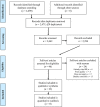An Integrative Review of Team Nursing and Delegation: Implications for Nurse Staffing during COVID-19
- PMID: 34355844
- PMCID: PMC8450812
- DOI: 10.1111/wvn.12523
An Integrative Review of Team Nursing and Delegation: Implications for Nurse Staffing during COVID-19
Abstract
Background: During the COVID-19 pandemic, providing care for critically ill patients has been challenging due to the limited number of skilled nurses, rapid transmission of the virus, and increased patient acuity in relation to the virus. These factors have led to the implementation of team nursing as a model of nursing care out of necessity for resource allocation. Nurses can use prior evidence to inform the model of nursing care and reimagine patient care responsibilities during a crisis.
Purpose: To review the evidence for team nursing as a model of patient care and delegation and determine how it affects patient, nurse, and organizational outcomes.
Methods: We conducted an integrative review of team nursing and delegation using Whittemore and Knafl's (2005) methodology.
Results: We identified 22 team nursing articles, 21 delegation articles, and two papers about U.S. nursing laws and scopes of practice for delegation. Overall, team nursing had varied effects on patient, nursing, and organizational outcomes compared with other nursing care models. Education regarding delegation is critical for team nursing, and evidence indicates that it improves nurses' delegation knowledge, decision-making, and competency.
Linking evidence to action: Team nursing had both positive and negative outcomes for patients, nurses, and the organization. Delegation education improved team nursing care.
Keywords: care delivery system; critical care/intensive care; evidence-based practice; medical/surgical; nursing practice; patient outcomes/health care outcomes/treatment outcomes; work environment/working conditions.
© 2021 Sigma Theta Tau International.
Figures
References
-
- Badovinac, C. C., Wilson, S., & Woodhouse, D. (1999). The use of unlicensed assistive personnel and selected outcome indications. Nursing Economics, 17(4), 194–200. - PubMed
-
- Betz, M., Dickerson, T., & Wyatt, D. (1980). Cost and quality: Primary and team nursing compared. Nursing and Health Care: Official Publication of the National League for Nursing, 1(3), 150–157. - PubMed
-
- Butler, M., Schultz, T. J., Halligan, P., Sheridan, A., Kinsman, L., Rotter, T., … Drennan, J. (2019). Hospital nurse‐staffing models and patient‐ and staff‐related outcomes. The Cochrane Database of Systematic Reviews, 4(4), CD007019. https://www.cochranelibrary.com/cdsr/doi/10.1002/14651858.CD007019.pub3/... - PMC - PubMed
Publication types
MeSH terms
LinkOut - more resources
Full Text Sources
Medical



